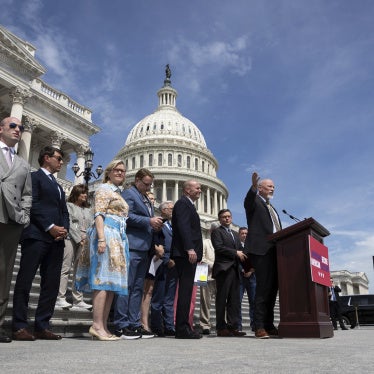Few would have predicted after the Sept. 11 terror attacks that the only states willing to host covert U.S. military operations near Afghanistan would be Uzbekistan and Tajikistan. In fact, few knew anything about the two Central Asian countries; they have been far off the radar screen of American foreign policy.
As Defense Secretary Donald Rumsfeld arrives in Uzbekistan today to seal the new alliance, one can only hope the Bush administration's understanding of the region's Soviet-era relics advances as quickly as its embrace of them.
President Bush first hinted at Central Asia's role in his Sept. 20 address to Congress, when he named the Islamic Movement of Uzbekistan as an ally of Osama bin Laden. The IMU, based in Afghanistan and Tajikistan, poses a genuine armed threat to Uzbekistan and its neighbors. But since 1997, the Uzbek government has used the threat to justify a total crackdown on "independent" Muslims -- those who pray at home, study the Koran in small groups, belong to peaceful Islamic organizations not registered with the state or disseminate literature not approved by the state. The government has sentenced thousands of these Muslims to jail terms as long as 20 years without connecting them to the IMU or to any violent acts.
Some of those targeted are members of the Hizb-ut-Tahrir (Party of Liberation), a group that supports the reestablishment of a caliphate, or Islamic state, by peaceful means. Some are independent imams who ran afoul of authorities by preaching without deference to a government-run religious board, by not praising the government in their sermons or by refusing to be informants. Hundreds of those who attended these imams' sermons are also in prison.
Those arrested endure the worst torture -- hanging by their feet or wrists, beatings with bottles filled with water, electroshock or rape --often for months on end. Meanwhile, wives and mothers are subjected to Soviet-style hate rallies, at which neighbors are assembled to denounce them as "enemies of the people."
President Bush has said eloquently that the struggle against terrorism cannot become a war against Islam. Yet America's closest ally in Central Asia is undeniably waging war on virtually any form of Islam not controlled by its ruthless state, potentially undermining one of the president's core strategic objectives.
How long will it be before the sons and brothers of peaceful Muslim believers now in prison opt for violence? What if Uzbeks turn their resentment not only on their abusive regime but against the Americans stationing forces on their soil? What if Uzbekistan or its equally repressive neighbors then turn to the United States for help in putting down an escalating internal threat -- real or perceived?
The challenge for the United States will be to ally itself with Uzbekistan without aligning itself with Uzbekistan's policies. A good way would be to include it on a list of countries that violate religious freedom -- a list the State Department has repeatedly delayed releasing to avoid offending its allies. U.S. officials should meet with the brave few remaining Uzbek human rights defenders, and publicly urge the release of religious prisoners. And they should remember that Uzbekistan already has its own interest in countering bin Laden. Its cooperation should not have to be bought with the unconditional economic rewards the Bush team is reportedly considering.
If Uzbekistan balks, the United States can answer with words the president has suggested: "You are with us or against us. And if you are with us, you will not play into the hands of the terrorists by alienating vast numbers of peaceful Muslim believers."
America's answer should never be: "Either you are with us or we will pay you to be with us."
The key is to see Central Asia not merely as a staging ground for battles fought elsewhere but as a proving ground for principles on which an effective battle against terrorism depends. One principle should still be that smart governments distinguish between those who commit acts of terror and those guilty of nothing more than sharing their religion.







